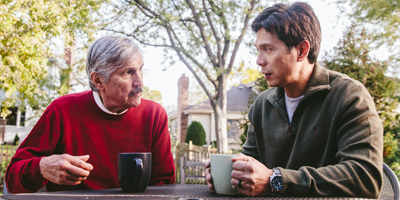Ask a Care Consultant: Holidays and dementia – Alzheimer’s – Optimum Senior Care – Chicago In Home Care – www.OptimumSeniorCare.com
Holiday celebrations are often joyous occasions, but they can also be challenging and stressful. The Alzheimer’s Association Illinois Chapter tells caregivers and families that with some planning and adjusted expectations, the holidays can still be happy and memorable occasions for everyone.
Ask a Care Consultant: Holidays and dementia
The holidays can be a challenging time for families coping with dementia. Planning ahead and knowing what to expect can make this time less stressful. It’s also important to adjust your expectations—don’t try to put too much on yourself or on the person with dementia.
Planning ahead
Communication is key here. If you have people coming in from out of town you may need to clearly communicate with them regarding your caregiving situation, and what the person with dementia is and is not capable of. In the early stages of dementia, your loved one may seem to not have changed very much, but may have trouble with large groups or following a conversation. Telling visitors ahead of time that they can help by being patient, and not interrupting or correcting the person with dementia, will help prevent frustration and hurt feelings.
If the person with dementia is in the later or middle stages, there may be significant changes since the last time the visitors saw him or her. These changes can be difficult to accept, and it can be helpful to prepare the visitors in advance so that they know what to expect. For example, if the person with dementia might not recognize them it can be less hurtful if they understand in advance that this is a part of the disease process.
Don’t take on too much
Holidays can be stressful even without the added responsibility of being a caregiver. Do not be afraid of scaling back your celebration, and delegate, delegate, delegate. Clear communication is key here, as well. Consider scheduling a conference call with other family members to divide up responsibilities, and to set appropriate boundaries on what you can and cannot do. Consider scaling back to a smaller celebration to avoid overwhelming yourself and the person with dementia.
Focus on meaning
Look for ways to involve your loved one in meaningful activities that they can enjoy. Singing along with holiday songs can allow people even in the later stages to connect and feel part of the holiday. Looking through photo albums of past holidays and reminiscing with your loved one can be a soothing and meaningful way to spend time together. Perhaps they can help set the table or tie the ribbons on the gifts. Look for ways that your loved one can be a part of the celebration by scaling down activities to a level that is manageable for them.
Celebrating in a facility
When a family member is in a residential facility, people often want to know if it is a good idea to bring them home for the holidays. Consider carefully if this is wise for you and for the person with dementia. Sometimes changes in routine can be upsetting for the person with dementia, and they may not do well in a crowd of noisy people. Think about joining your loved one at the facility in their holiday celebration.
Take care of yourself
Be realistic about what you can and cannot do during this stressful time. Caregivers often feel guilty that they are not “doing enough” for the person with dementia and for their families. Holidays can make these feelings even harder to deal with when we have so many expectations about how things are supposed to be. Try to let go of these expectations, and give yourself some quiet time to grieve if you need to. As much as you can, focus on the moments of connection and happiness that you share with all your family members, and give yourself permission to not do it all.
http://www.optimumseniorcare.com/services/alzheimerscare.php
http://optimumseniorcare.com/blog/


 Sharing your diagnosis with others is an important step toward integrating Alzheimer’s disease into your life. You may be hesitant to share your diagnosis with some people, given the impact such a disclosure may have for you. Keep this mantra in mind: Alzheimer’s disease is not your fault.
Sharing your diagnosis with others is an important step toward integrating Alzheimer’s disease into your life. You may be hesitant to share your diagnosis with some people, given the impact such a disclosure may have for you. Keep this mantra in mind: Alzheimer’s disease is not your fault.

